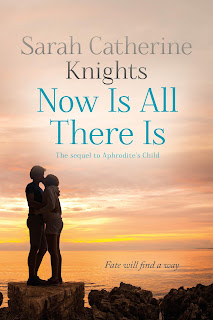I've just found my blog! I forgot it for four years - what on earth's been going on in my life? Well, to start with I've completed that third novel of the last post and published it. It's called Love is a State of Mind and I've completed my fourth book, Shadows in the Rock, which is the third book in the Aphrodite Trilogy. So I've achieved quite a lot I think. Oh ... and my daughter's had twins and moved to America so I've been on travelling granny duty. I've got excuses.
I will talk about the two books on separate posts I think but in the meantime, I do exist. I LIVE!
Comments (0)
I love both my jobs and don't regard them as work. I may be 61 but I have no intention of retiring.
My name is Sarah Catherine Knights and I live in Malmesbury Wiltshire with my husband, Peter and our black labrador, Juno.
I used to be a teacher, but I gave that up to become a portrait photographer and then in 2012, I did an MA in creative writing which started me on my third career as a novelist.
Peter and I have three grown-up children who live in London and Brighton; we are a close family and get together as much as possible. Every year, we all go to a restored lifeboat station in Cornwall for a week. This is a very precious time – it's rare to get everyone together, once your children have left home . Peter and I also go out to our house in Cyprus, two or three times a year. So life is good; I feel as if my third career is the one I should have been doing all my life, but maybe I had to get to this age to have the confidence to do it.
. Peter and I also go out to our house in Cyprus, two or three times a year. So life is good; I feel as if my third career is the one I should have been doing all my life, but maybe I had to get to this age to have the confidence to do it.
How many times in your life have you wished you'd done something that someone else has done? Well, that was me with writing. Every time I finished a novel, I would think to myself 'I wish I'd written that' or 'I could have written that'. I suppose three children, jobs and general family life got in the way and I never pursued those dreams.
It was only when the children left home and I had more time to think that I realised it was something I really wanted to do. I started googling creative writing courses and found a perfect one near my home. I thought I needed the discipline of a course to force me to write – I had a fear of failure in my personality, which I thought a course could help me with.
It was the best decision I've ever made. Although it was terrifying having my writing talked about in workshops, I loved the feedback I got from everyone. We were all in the same boat so we tried to help and encourage each other. It was such a positive experience that it gave me the confidence to carry on. I found my writing improved greatly through this process.
I had worried that I would be the oldest person on the course by a mile, but the very first person I met when I arrived was older than me and it turned out that 50 per cent of the people were my age. We all came from completely different walks of life, but we all had the same things in common: a desire to write and the time to do it. If I'd done that course in my twenties, I would have found it much more difficult; with age, comes a certain amount of self-belief and a feeling that you've got nothing to lose – you may as well have a go.
So, how do you go about writing a novel? I'd always shied away from long projects in the past, of whatever kind. I'd often get bored half-way through and just want to get it finished and done with. It came as a surprise to me, then, that I was even prepared to contemplate such a large task, but having decided to do it, I stuck with it and saw it through to the end. I published my first novel, Aphrodite's Child, in February this year and it's been fantastic. I often get messages on Facebook or email from readers, saying how much they've enjoyed it and it gives me such a buzz to thinksomething I've created has entertained so many people.
Here are a few tips that I picked up on my course and that I've learned through experience:
Write about what you know. There's no point writing about something you know nothing about – it won't seem real to the reader. So, if you're a barrister, for example, it would be good to write a story that involves the law and court procedure, because you know it so well. I chose to write about an RAF officer's wife going to live in Cyprus. It had happened to me, so I could describe it from experience. The reader knows when something isn't authentic.
One of the first things you should decide is – who is telling the story? This is a key decision – I didn't realise this myself, even though I've read thousands of novels, until I did the course. Are you going to tell it in the first person, the third person or have an omniscient narrator?
The reader has got to want to find out what happens to your main character; if he or she is boring or unlikeable, it's pretty well guaranteed that the reader won't give a damn about him or her, and give up reading.
It sounds corny, but your main character should go on an emotional journey of some sort. They should learn something fundamental about themselves and others.
You should know who your target audience is before you start writing. Be absolutely clear in your own mind – men or women readers? Young women? Older men? Teenagers? If you don't know who you're writing for, your book won't appeal to anyone.
Work out your general plot before you start. You don't need to know everything between A and Z, but if you don't have a plan, the plot will lose its way. Create a time line.
Getting from A to Z is hard. The average novel is 80,000 words. What I did was to not think about the whole novel all the time, it was too daunting. I thought of 'scenes', not even chapters. Scenes that moved the plot on and showed why people were acting in certain ways.
Vary the pace of the novel – sometimes weeks and months can go by in a paragraph and sometimes a few minutes takes three pages to write about. It's a little like photography – sometimes you have a wide angle lens and sometimes you zoom in, to see the detail.
Intersperse your descriptions and reflections with lively dialogue, but don't write speech that tells you nothing. Every conversation must either advance the plot or tell you about the character.
The last thing I will say is there is another big decision to make. Are you going to try to get an agent and wait for that six figure publishing deal or are you going to go down the self-publishing route? There are pros and cons to both ways and they are not mutually exclusive. I went down the self-publishing route and I would thoroughly recommend it. You don't have to wait for anyone; you can put it on the internet and see if anyone wants to read it. You are in complete control of your story, your cover, your marketing. It's hard work but ultimately, very satisfying.
Don't go into writing thinking you're going to become a best-seller and make your millions – you may be lucky, but you probably won't. Go into writing because you have a huge desire to write.
It's difficult facing an empty screen everyday, so you've really got to want to do it, but if you do, I guarantee you'll find it one of the best things you've ever done.
Aphrodite's Child by Sarah Catherine Knights is available from Amazon, £8.68 (ebook £1.99)




.jpg)

.jpg)